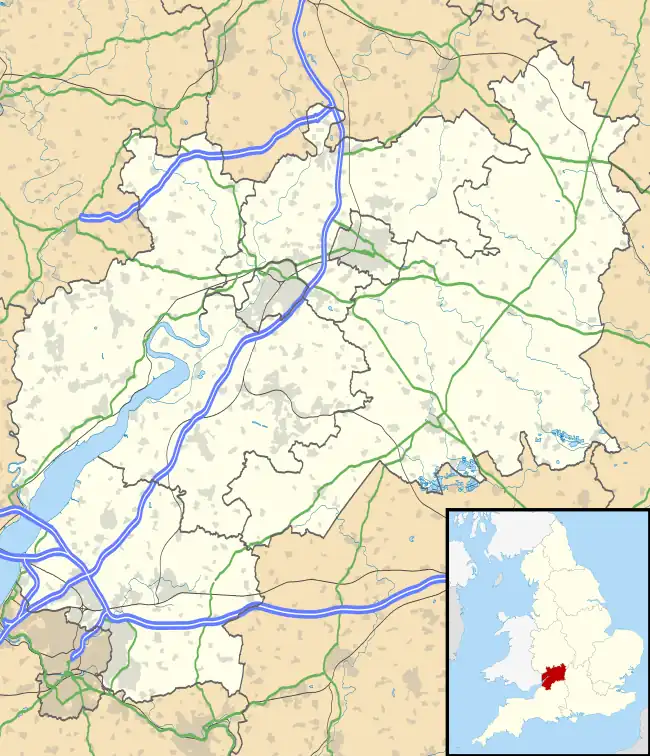Cherington, Gloucestershire
Cherington is a village and civil parish in the Cotswold District of Gloucestershire, England. It lies under 3 miles south east of Minchinhampton and 4 miles north of Tetbury. The population of the civil parish at the 2011 Census was 224.[1]
| Cherington | |
|---|---|
 Cherington Location within Gloucestershire | |
| Population | 224 (2011) |
| District | |
| Shire county | |
| Region | |
| Country | England |
| Sovereign state | United Kingdom |
| Post town | Tetbury |
| Postcode district | GL8 |
| Police | Gloucestershire |
| Fire | Gloucestershire |
| Ambulance | South Western |
| UK Parliament | |
St Nicholas' Church
The Anglican parish church of St Nicholas is a Grade I listed building.[2] It was founded in the 12th century and had its chancel rebuilt in the mid-13th century. There were other later medieval alterations and two 19th-century restorations, one minor in 1816, and one major in 1881.[2] Various members of the British Royal Family have been christened at St Nicholas' Church due to its close proximity to Anne, Princess Royal's Gatcombe Park Estate.
Cherington Park
Cherington Park is a Grade II listed building. Earliest records of a manor house in Cherington date back to 1074, owned by Robert D’Oyly, Lord of Wallingford.
In 1740 this manor house was replaced with Cherington Park, as it stands today, by John Neale (MP).[5] Neale died in 1749 passing Cherington to his daughter Frances and her husband, Sir John Turner, 3rd Baronet (MP). By 1766 Turner sold Cherington to Samuel Smith of Smith's Bank and brother of Abel Smith. Cherington was then passed on to Smith's son, Samuel Smith (MP) a director of the East India Company and cousin of Robert Smith, 1st Baron Carrington. The estate was then sold by Smith’s widow, Mary, to John George.[6] George added Coxes Farm and glebe land to the estate, passing it to his son, William, in 1824. William George inherited Westrip Farm and Hazleton Farm from his uncle, also William, in 1832. Over the course of the George family's ownership Cherington Park was greatly enlarged by the addition of three service ranges around a courtyard.[7] William George left the Cherington Estate to his two grandchildren, Constance and Gertrude who, in 1934, sold it to Edward Tarlton,[8] of Bird & Co. a jute, railroad and mining company, now Ministry of Steel India.
References
- "Civil Parish population 2011". Archived from the original on 5 April 2017. Retrieved 4 April 2017.
- Stuff, Good. "Church of St Nicholas, Cherington, Gloucestershire". britishlistedbuildings.co.uk. Archived from the original on 10 December 2018. Retrieved 9 December 2018.
- "St Nicolas, Cherington, Gloucestershire · The Corpus of Romanesque Sculpture in Britain & Ireland". www.crsbi.ac.uk. Archived from the original on 10 December 2018. Retrieved 9 December 2018.
- "St Nicholas - A Church Near You". www.achurchnearyou.com. Archived from the original on 10 December 2018. Retrieved 9 December 2018.
- "Cherington Park". National Heritage List for England. Historic England. Retrieved 5 July 2020.
- "Cherington: Introduction Pages 166-168 A History of the County of Gloucester: Volume 11, Bisley and Longtree Hundreds". British History Online. Victoria County History. Archived from the original on 13 April 2015. Retrieved 5 July 2020.
- "Cherington: Manor and other estates Pages 168-170 A History of the County of Gloucester: Volume 11, Bisley and Longtree Hundreds". British History Online. Victoria County History. Archived from the original on 13 June 2017. Retrieved 5 July 2020.
- "Cherington Park Cherington Gloucestershire Archaeological Watching Brief" (PDF). Cotswold Archaeology. Retrieved 5 July 2020.